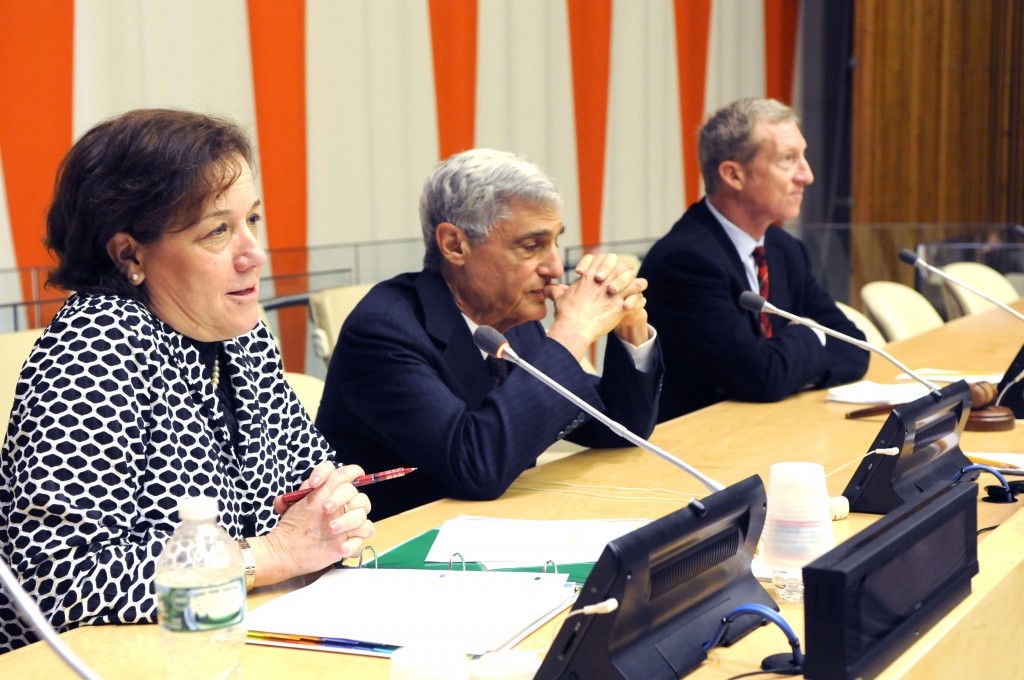Ceres – Investors for a Clean Renewable Future
This level of corporate interest may give us all hope.
By George Harvey
Every once in a while, a news story comes up about a relatively little-known non-profit group in Boston called Ceres. We have mentioned in before in Green Energy Times, and perhaps it is time to explain better what it is.
Ceres is unique. Ceres was founded by investors after the Exxon Valdez oil spill in 1989, with the intention of preventing further environmental mishap as much as possible. As a result, it is devoted to a combination two things, sustainability and investment. Sustainability, of course, includes environmentalism.

Ceres President Mindy Lubber with Robert Rubin and Tom Steyer at the Ceres’ 2014 Investor Summit on Climate Risk at the UN in New York. Photo courtesy of Ceres.
The people of Ceres were not content to be just another investor group that identifies companies with good records, then to praise or even invest in them. What they wanted to do was to persuade companies to be environmentally responsible.
It is not easy to persuade companies to do what is right for its own sake. For example, when Ceres’ representatives suggested to managers of investor portfolios that they put money into the growing renewable power market, they found that the managers were guided by mission statements that excluded anything that might be considered risky, and renewables were mostly considered risky.
After a little over ten years, the people at Ceres came up with a brilliant idea. It was to ask investors and corporations whether they had analyzed the risks associated for their businesses from climate change. The businesses were obliged, by the same guidance that had prevented them from investing in renewable power, to consider any risk they might become aware of. And so, in the period of 2002 to 2003, Ceres started promoting an understanding of “climate risk,” a term they coined.
As business and financial people, representatives of Ceres were able to walk into the boardrooms of businesses and tell the members of the board how they could increase profits by operating sustainable businesses. By doing this, they formed a coalition of network of major businesses that work with them, including such members as Allstate Insurance, Bank of America, Ben & Jerry’s, Best Buy, Bloomberg, Citi, Coca-Cola, conEdison, Dell, Ebay, Exelon, Ford, Gap, General Mills, General Motors, JPMorgan Chase & Co., Morgan Stanley, Nike, Northeast Utilities, PepsiCo, PG&E, Prudential Financial, Seventh Generation, Sprint, Time Warner, Virgin America, Walt Disney, Wells Fargo and many others.
Using the same approach, they formed an equally impressive group called the Ceres Coalition. This group is largely made up of organizations managing pension funds, investment organizations, and treasurers of various states, but also includes environmental organizations, church groups, advocacy groups and others. They also formed a coalition of investors, who are willing to take part in some of Ceres activities.
Ceres and their various affiliates get very active at local levels across the country. When a proposed law or policy comes to their attention, for example, they have professionals who are qualified and ready to testify before legislatures about environmental impacts and their effects on business. The members can operate in a large variety of situations, as they have a large variety of skill sets.
Today, Ceres can motivate businesses and investors who have come to appreciate the risks of climate change to consider more closely the advantages of putting investment into renewable power. They have started the “Clean Trillion” campaign, which aims at getting global investment in renewables to a trillion dollars per year, about four times the current level. Christopher Fox, Ceres’ Director of Special Projects commented on the prospects of achieving this goal, saying, “I think the transition to a cleaner economy is inevitable. The question is whether we will invest enough soon enough to limit human suffering.”
When investors of Ceres’ network met at the UN last January, they called for the fossil fuel industry to assess the risks of climate change. The investors making this call had $12 trillion behind it. Seeing this level of corporate interest may give us all hope.








Leave a Reply